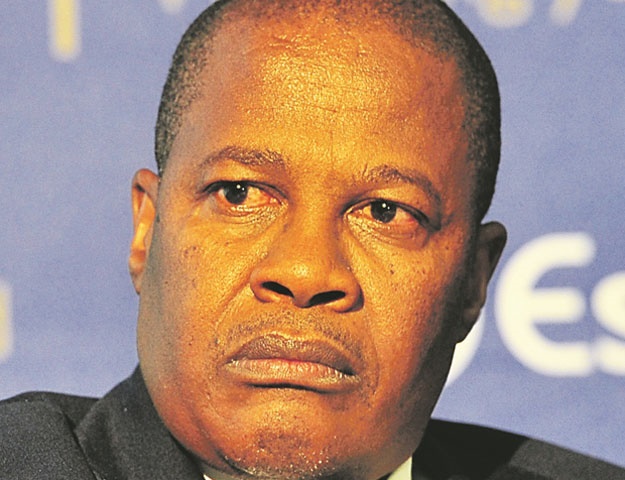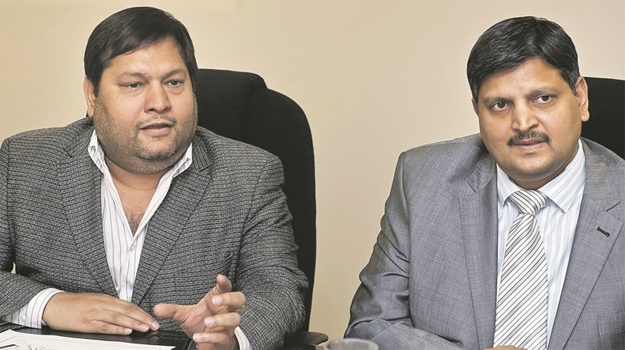Johannesburg - The year 2016 will go down as a tough one for the local economy as the country just missed a recession and unemployment reached a 13-year high.
The local economy was expected to grow by between 0% and 0.5% this year, the lowest growth since 2009, while the latest figures put unemployment at 27%, the highest since 2003.
Amid this news, the National Treasury has been a focal point for investors, given the risk that prevailed throughout the year that South Africa could lose its investment grade credit rating from all three major agencies for the first time in 15 years.
However, at the end of this year, Moody’s Investors Service, S&P Global and Fitch Ratings kept South Africa’s ratings at investment grade, but it was a close call.
During the year, the South African economy dropped to third place in Africa, behind Nigeria and Egypt.
GORDHAN UNDER FIRE
Finance Minister Pravin Gordhan has been under fire from a number of quarters, including SA Revenue Service commissioner Tom Moyane and the National Prosecuting Authority.
Throughout the year, it appeared as though the cold war between Gordhan and President Jacob Zuma and his proxies would never end but, by December, Gordhan was still in his post a year after Nhlanhla Nene was unceremoniously fired from the same position.
A big focus in 2016 was on Eskom and energy supply.The renewable energy programme that has been run out of the department of energy has been hailed as a success and attracted almost R200 billion in investment.
However, this year, Brian Molefe, as Eskom CEO at the time, put a halt to signing up new renewable energy producers as he objected to the prices they charged and he said they could not provide continuous power supply the way coal and nuclear power stations could.
Molefe, before he tendered his resignation in November, was a staunch supporter of plans to add extra nuclear power.
After the release of outgoing public protector Thuli Madonsela’s State of Capture report, Molefe showed his upset in public and ultimately resigned, after which Minister of Public Enterprises Lynne Brown appointed Matshela Koko, head of Eskom generation, as Eskom’s acting CEO.
IPPs AND THE NATIONAL AIRLINE
The department of energy announced the gas and coal independent power producers (IPPs) during the year. The gas IPPs will be located in Coega and Richards Bay while the coal IPPs are Khanyisa, based in Mpumalanga, and the Limpopo-based Thabametsi.
It was a rough year for SAA, with the national airline battling to get further guarantees out of the National Treasury, while sustaining billions in losses.
In the end, after a new board was put in place, SAA received an extra R5 billion in state guarantees to boost its total guarantees of almost R20 billion.
In August, SAA was hit with a R105 million fine, related to the defunct Nationwide Airlines, by the Competition Tribunal for contraventions of the Competition Act.
SAA is also being sued by Comair for damages for abusing its market dominance, in a claim that could reach R2 billion once interest is factored in.
The state airline company also ended up in court after it suspended its treasurer, Cynthia Stimpel, for blowing the whistle on a dodgy finance deal involving little-known company BnP Capital.
FUTUREGROWTH
During the year, Futuregrowth Asset Management, which manages R170 billion in funds, decided to cut funding to six parastatals before reducing the capital strike to just three of them – Eskom, Transnet and the South African National Roads Agency Limited (Sanral).
Futuregrowth’s decision caused Moody’s to put the credit ratings of five state-owned companies on review but the agency later affirmed the ratings of all of them.
Sanral is still battling to get road users to pay for e-tolls, with billions of rands in fees outstanding.
EMPOWERMENT AND TRANSFORMATION
On the empowerment and transformation front in 2016, organisations like the Black Management Forum and the Black Business Council lamented the fact that progress with empowerment had regressed from the advances of the past.
With the idea of boosting empowerment, Zuma announced this year that the Preferential Procurement Policy Framework Act would be repealed and replaced with the Public Procurement Act.
Another programme to develop black capitalists is the department of trade and industry’s Black Industrialist Programme. At last count, the government had invested R1.4 billion into the programme, for 22 projects.
On the positive side, it emerged this year that South Africa’s black middle class has trebled over the past 12 years to close to 6 million people.
The Broad-Based Black Economic Empowerment Commission is receiving ever more complaints, with 134 objections received so far by the commission, the majority of them about fronting.
DROUGHT
The effects of the devastating drought continued to plague the country, pushing up food prices.
However, the prospects for improved food supply in the coming months are good as there has been a switch from an El Niño to a La Niña weather episode in the Pacific Ocean, which means South Africa could see above-normal rainfall.
Elsewhere in the food sector, the poultry industry has been slashing jobs amid sharp drops in profitability due to higher feed costs and imports from the EU.
TELECOMMUNICATIONS
In the telecommunications industry, the biggest news of the year continued to be MTN’s battle to lower the $3.9 billion fine it received from the Nigerian Communications Commission for unregistered SIM cards. The telecoms giant managed to reduce the fine to $1 billion.
As the year is closing, it faces further trouble there due to allegations that it illegally moved $14 billion out of the country.
Elsewhere in the telecoms space, a highlight was the news that, six years after launching its mobile business, Telkom’s cellular unit had turned an operating profit for the first time.
This follows almost R10 billion in investment in the mobile division up until the end of the September and more than R7 billion in operating losses from its launch in October 2010 to March this year.
Another noteworthy event in telecoms was the Constitutional Court ruling that Vodacom was bound by an agreement with Please Call Me founder Nkosana Makate to compensate him for his idea. Vodacom and Makate remain in talks about the size of the settlement.
SABMILLER IS NO MORE
The largest acquisition of the year was the $109 billion takeover of SABMiller, which first listed on the JSE in 1897, by Anheuser-Busch InBev (AB InBev).
On the local market, AB InBev has not made any big moves yet, but watch this space.
Also on the alcohol front, the Liquor Amendment Bill was released by the government and suggests that the legal drinking age be hiked from 18 to 21 years.
One of the biggest storms of the year centred around the many businesses controlled by the Gupta family.
The real drama came when JSE-listed Oakbay Resources & Energy lost its auditor, KPMG; banker, Absa; and JSE-sponsor Sasfin shortly after Deputy Finance Minister Mcebisi Jonas revealed that the Guptas had offered him the position of finance minister in 2015.
The other major banks then also cut ties with the Gupta family businesses.
American fast food brands continued to pour into the country during the year, with Starbucks, Dunkin’ Donuts, Krispy Kreme and Baskin-Robbins all opening their first stores in South Africa in 2016.
MINING AND FINANCES
In the mining sector, the major developments were the events surrounding the third mining charter, about which the government and the mines have been at odds.
As the year closes, the department of mineral resources is expected to release the final version of the charter with the Chamber of Mines threatening to challenge any sections of the charter its finds repugnant.
Anglo American continued on its path to sell mines in order to cut its debt and focus on platinum, diamond and copper operations.
The directors of Aurora Empowerment Systems got their just deserts when the Supreme Court of Appeal dismissed their appeal against a judgment that they should pay damages and salaries to some 5 300 mine workers who were once employed by them.
Khulubuse Zuma agreed to pay R23 million in damages to the Pamodzi and Aurora liquidators while the Bhana family members, who were involved in the destruction of Aurora, were sequestrated.
During the year, mine workers and their dependants gained the right to sue the mining industry for damages related to silicosis and tuberculosis.
In Mpumalanga, the Lily gold mine remains shut and under business rescue after a sinkhole trapped three miners underground.
Tension between mines and communities made the news this year with Xolobeni on the Wild Coast and Richards Bay being key focal points of community outrage.
After making billions in losses and going bankrupt, a new African Bank was launched, with new shareholders and plans to turn a profit. During its first six months, the bank reported a loss of R1.7 billion, which evidently means it has some way to go.
On the tax front, two new and contentious taxes loom on the horizon – the sugar tax on beverages and the carbon tax.
Given the stagnant economy, National Treasury is expected to announce a hike in taxes in February next year to generate an extra R28 billion in tax revenue.
In the banking and financial sector, Old Mutual announced that it would be split into four pieces, Barclays sold its stake in Absa down to just above 50%, and Capitec continued to grow at breakneck speed and launched a credit card.
RETAIL AND HOSPITALITY
In the retail sector, ailing retailer Edcon spent the year trying to get itself out of a mountain of debt.
The major debt reduction event was the move by US private equity firm Bain Capital to forfeit its stake in a deal that saw Edcon’s bond holders become its shareholders, while at the same time debt is set to fall from R29 billion to R7 billion once the deal is implemented next year.
Another big event in the retail sector was the news that Shoprite CEO Whitey Basson would resign at the end of 2016 after 37 years as the head of the retailer.
Of substantial significance internationally in 2016 was the UK referendum that decided that the UK would exit the EU, also known as Brexit.
Philip Hammond, UK chancellor of the exchequer, later visited South Africa to allay related fears among local politicians and business people.
Transportation company Uber cut its local fares this year, but came under fire both from the drivers who use its app and its rivals. Uber later in the year launched its UberEats app, which allows the ordering of meals for delivery.
Also on the shared economy front, two domestic worker apps, Domestly and SweepSouth, expanded out of their home bases in Cape Town.
In the hotel sector, Carlson Rezidor announced plans to spend R1 billion on three new hotels in South Africa, while Marriot launched five at a cost of R3 billion.
Policy around the national minimum wage unfolded, with the proposed level set to be R3 500 a month.
Read Fin24's top stories trending on Twitter: Fin24’s top stories



 Publications
Publications
 Partners
Partners















